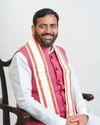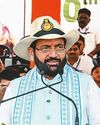Versuchen GOLD - Frei
Why The World's Biggest Movie Star Can't Speak On Indo-Pak Peace?
Outlook
|April 25, 2016
It's a shame that a superstar can't talk of Indo-Pak peace

Lots of Pakistanis love Lata Mangeshkar, but they hate India. Many Indians love Rahat Fateh Ali Khan, but they consider Pakistan a terrorist country. Recently, a young batsman of the Pakistani cricket team told me he wants to “become Virat Kohli” but he is always reluctant to accept that in public. Some days back, I met movie star Shahrukh Khan in Dubai. Interviewing him for Geo TV, I tried to discuss the importance of peace and tolerance for the people of India and Pakistan. But his media managers shouted: “Don’t enter red zones.” I never realised that the world’s biggest movie star has no star power to speak on peace and tolerance between his country and its neighbour. Over the last few days, I feel that’s equally true of our prime ministers, Nawaz Sharif and Narendra Modi. The two elected leaders can say a lot but find it difficult to move fast in the direction of peace and tolerance.
I have met Sharif many times after his December 25 meeting with Modi in Lahore. Each time, he was anxious to improve relations with India, and was very optimistic when India allowed Pakistani investigators to visit the Pathankot base, where terrorists had struck. But the day the team was to reach the base, Lt Gen Asim Saleem Bajwa, the Pakistani army spokesman, announced the arrest of a “RAW agent” called Kulbhushan Yadav in Balochistan. Information minister Pervez Rashid was present at the press conference but spoke not a word on Yadav. The Pakistani media pounced on this and taunted that maybe Sharif and his ministers were not happy about the arrest. Some jingoists on social media declared Sharif an agent of India’s spy agency, the Research and Analysis Wing, or RAW. Modi faces similar taunts, and rivals ask, “Do we have an ISI agent as a prime minister now?”
Diese Geschichte stammt aus der April 25, 2016-Ausgabe von Outlook.
Abonnieren Sie Magzter GOLD, um auf Tausende kuratierter Premium-Geschichten und über 9.000 Zeitschriften und Zeitungen zuzugreifen.
Sie sind bereits Abonnent? Anmelden
WEITERE GESCHICHTEN VON Outlook

Outlook
From Margins to Mainstream The Inclusive Growth Story
Haryana leads the way in welfare reforms with schemes imaginatively redesigned to support the vulnerable — women, students, workers, and the marginalised
4 mins
December 01, 2025

Outlook
One year of Saini Govt. marked by holistic and inclusive governance, social welfare
75 percent of promises kept and worked upon in one-fifth of tenure
4 mins
December 01, 2025

Outlook
Nurturing Urban Dreams on Rural Foundation Haryana's Housing Push Gains Pace
Haryana has redefined housing development with equity at its core. Through 'Housing for All', the state hasn't just built structures, it has rebuilt lives. From makeshift shelters to permanent homes marks a powerful journey on the road to social uplift and inclusive growth
3 mins
December 01, 2025

Outlook
Haryana, The Medal Factory, Powering India's Olympic Dreams
Haryana has risen as the undisputed powerhouse of Indian sports, blending grassroots talent, world-class infrastructure, and visionary policies
2 mins
December 01, 2025

Outlook
No Woman's Land
The Left parties, which champion women's representation and empowerment, fielded only one woman among their 33 candidates in the Bihar election
6 mins
December 01, 2025

Outlook
Dignity With Jobs Youth Take the Centre Stage
Over four lakh job-seekers connected, thousands trained, and a generation empowered -- technology, transparency, and training redefine Haryana's employment landscape
2 mins
December 01, 2025
Outlook
Haryana Means Business; Here, Policy Meets Progress
Haryana is redefining industrial growth with investor-centric policies, cutting-edge digital governance, and infrastructure – making it a top destination for innovation, ease of business, and investment
3 mins
December 01, 2025

Outlook
Guarding Those Who Guard Us Haryana's Bold Vision for Soldier Welfare
With enhanced financial aid, medical grants, and priority for Agniveers in state jobs, Haryana is championing long-term opportunity and security for soldiers, ex-servicemen, and patriotic youth across the state
3 mins
December 01, 2025

Outlook
Lighting the Way with Clean Energy and People-Focussed Reforms
Haryana has transformed its power sector through a combination of rapid electrification, clean energy initiatives, and people-focussed reforms
3 mins
December 01, 2025

Outlook
Policing With A Human Touch Haryana's Tech-Led Transformation
From AI-enabled emergency response systems to pioneering forensic setup, from women's safety initiatives to cybercrime crackdowns, Haryana is setting new standards in technology-driven governance and public safety
3 mins
December 01, 2025
Translate
Change font size

